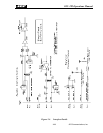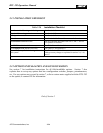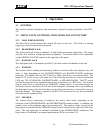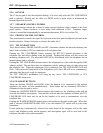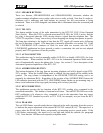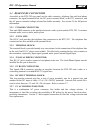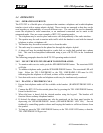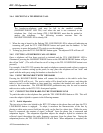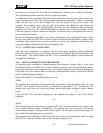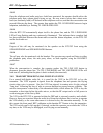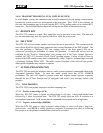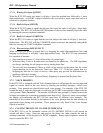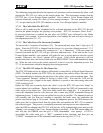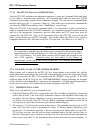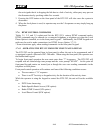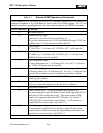
RTU-292 Operations Manual
noise source is switched off, the LED is lit continuously, and the unit is ready for operation.
This adaptation procedure normally takes less than one second.
For adaptation to be successful, the far end of the phone line must be quiet (there must be no
signal coming into the RTU-292 from the phone line during adaptation). If there is incoming
audio, the unit may not be able to adapt, but will keep trying for up to ten seconds. For
example, the telephone user at the far end of the phone line should not talk during the
adaptation cycle. If the TEL LINE/RADIO LED does not stop flashing within the normal
second or two after the TEL LINE/RADIO button is pushed, wait a short time longer. If the
LED still continues to flash, chances are that there is excessive noise on the phone line, and it is
best to hang up and redial.
Because the adaptation algorithm is very robust, connection to an unquiet phone line is about
the only case where the RTU-292 will fail to adapt, as the hybrid has the ability to adapt to line
conditions from a short-circuit to an open-circuit, as well as the impedance presented by the
extremely complex distributed network of a telephone line.
3.4.7.2 CONTINUOUS ADAPTATION
Once the initial adaptation is complete and the unit begins operating, hybrid adaptation
proceeds continuously using receiver audio sent down the telephone line (the noise burst is not
needed again). This feature enables the RTU-292 to automatically adapt its hybrid balance to
changing line conditions.
3.4.8 MANUAL PHONE PATCH PROCEDURE
A telephone patch establishes a communications link between a distant radio, a local radio
(interfaced directly to the RTU-292 via the P1 Radio connector) and a distant telephone that is
connected to the unit via the telephone line. This distant telephone will be patched through the
local radio set to the distant radio set allowing communication directly between the distant
radio set and the distant telephone.
Begin with the RTU-292 installed and its power on:
3.4.8.1
The operator first establishes a link between the local radio set and the distant radio set using
the RTU-292’s handset with the radio, as described in paragraph 3.4.6. Alternatively, the
operator may have received a radio call from a distant radio party wishing to make a phone
patch.
Using the RTU-292’s internal telephone set, the operator now places a call to the distant
telephone.
Or
3.4.8.2
The operator begins the procedure by using the RTU-292’s internal telephone set to place a call
to the distant telephone party. Alternatively, The operator may have received a call from a
distant telephone party wishing to make a phone patch. He then places the telephone party on
hold while the distant radio party is contacted.
The operator then establishes a link between the local radio set and the distant radio set using
the RTU-292’s handset with the radio, as described in paragraph 3.4.6.
JPS Communications, Inc.
3-7



